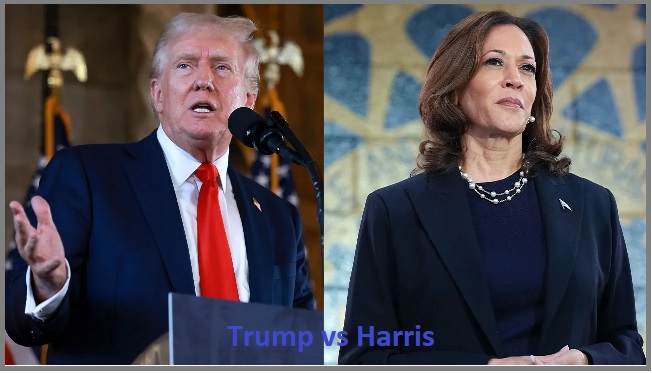
(Photo : Trump vs Harris)
Trump vs Harris
- In the 2024 US Presidential election, Trump leads with 120 electoral votes, Harris trails with Projections are based on predictably partisan states, with seven battleground states yet to be included.
- Over 82 million Americans cast their ballot before Election Day, more than half of the total votes in 2020.
- The race is still on, with the battleground states playing a crucial role in determining the outcome.
The 2024 US Presidential election has seen former President Donald Trump secure 120 electoral college votes, while Vice-President Kamala Harris trails with 99 votes. These projections, based on the closing of polls in states at 9 p.m. Eastern time, were announced by the Associated Press. The projections are primarily from predictably partisan states that have historically voted either Democratic or Republican. The battleground states, seven in total, were not included in these early projections.
Trump was projected to win Kentucky, Indiana, West Virginia, South Carolina, Florida, Oklahoma, Alabama, Tennessee, Missouri, North Dakota, South Dakota, Wyoming, and Louisiana. On the other hand, Harris was projected to secure Vermont, Massachusetts, Maryland, Rhode Island, Connecticut, Illinois, and New York. The race to the White House requires the winner to secure at least 270 of the 538 electoral college votes. The contest is still on in the battleground states of North Carolina, Pennsylvania, Wisconsin, Michigan, Georgia, Arizona, and Nevada.
These states, also known as Swing States, are neither solidly Democratic nor Republican and can swing between the two. The projections were announced shortly after the close of polling in some states, including Georgia, one of the seven battleground states that will determine the outcome of the 2024 race for president.
Battleground States and Early Voting Trends
These early projections are based on the history of polling in the state and are based on early trends that are not expected to change much through the night or later, on the completion of the full count of the polled votes. More than 82 million American voters had already cast their ballot before Tuesday, called Election Day, either through in-person voting at early voting stations or through postal ballot. This was more than 51 per cent of the total of 158 million votes that were cast in 2020, at the height of a raging Covid-19 pandemic.
Harris and Trump ended their campaign with rallies in Pennsylvania and Michigan respectively, also both battleground states. There are in all seven battleground states that will determine the 2024 White House race. The United States presidential election is still on a knife's edge between Republican candidate Donald Trump and Democratic candidate Kamala Harris. At the time of publication, Trump has claimed 230 electoral votes while Harris has taken 179.
The first of the seven key swing states at the US election has been called, with Donald Trump projected to win North Carolina. None of the other swing states - Georgia, Michigan, Wisconsin, Pennsylvania, Nevada and Arizona - have been called yet. None of the states that have been called so far for either candidate have flipped from the 2020 race between President Joe Biden and Trump.
Economic Factors and Legal Challenges
The economy is "the third candidate" in this election, Justin Lahart of The Wall Street Journal wrote - though exactly how it will influence voters is "less than straightforward." Despite the economy being strong by many measures, prices are still higher than before the pandemic, and "voters appear to have a longer memory for inflation than they do for economic growth," Lahart noted.
Voting is now closed, and ballots have begun counting in many. Early in-person and mail-in votes are expected to be tallied first in most states. Over 82 million people in the country took advantage of early voting to cast their ballots. Besides that, the results of the US presidential elections will decide not only the next president but also which party controls the two chambers of Congress-the Senate and the House of Representatives.
Kamala Harris, who could become the first female president if elected, has pledged to address economic concerns and other pressing issues through bipartisan cooperation, aiming to stay largely aligned with the path set by President Joe Biden, Trump has promised to replace thousands of federal workers with loyalists, impose sweeping tariffs on allies and foes alike, and stage the largest deportation operation in US history. Donald Trump won the presidency in 2016 because of the Electoral College. So did George W. Bush in 2000.
* This is a contributed article and this content does not necessarily represent the views of btin.co.in









